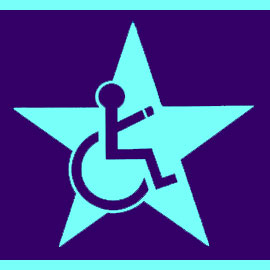
A paraplegic is a person who has lost some or all of the neurological function in their lower body. The condition is most commonly caused by a spinal cord injury due to trauma, congenital condition or disease process. Paraplegia might entail a simple reduction in the ability to move or feel the lower limbs or may completely paralyze the motor functions of the legs and prevent sensory perception of any feeling below the affected vertebral level.
This dialog focuses on life as a person with limited neurological functionality in the lower body.
Complete Paraplegic
Complete spinal cord injury to the lower thoracic, lumbar or sacral spinal regions will create total paralysis of the legs. In addition, many patients also suffer a host of other affective conditions including the loss of bladder and/or bowel control, sexual dysfunction and possible lower internal organ concerns.
Poor blood circulation is a real problem for many people with complete spinal injuries and complications can prove severe. Typically, persons with total neurological dysfunction will suffer a slow and weak immune response in the lower body, susceptibility to pressure sores, deep vein thrombosis and significant muscular atrophy.
Partial Paraplegic
Some patients may have suffered spinal cord damage which did not utterly sever or destroy all nerve functions. These patients usually respond better to treatment and might even regain some of their lost neurological signal in the future. There are many symptomatic profiles for partial paraplegics. The most common describes a person who can not walk, but does maintain feeling in some or all of the lower body. These patients usually keep control of the bowel and bladder functions, but simply do not have the ability to stand or walk. However, many variations can occur during partial paralysis.
Detailed information on this condition can be found on my page entitled incomplete spinal cord injury.
Partial Paralysis Care
Preventative healthcare should be every patient’s number one priority. Most paraplegia patients are confined to a wheelchair and require ongoing health maintenance to make sure they do not suffer any complications from their condition. Remember that patients without feeling in their lower body can not tell if they are developing a health problem which would be painful in a non-paralyzed person.
Finding a caring, compassionate and vigilant doctor is key to long-term good health as a paralyzed individual. Integrating physical therapy into your life is also beneficial and will help to improve circulation and build muscular strength in non-affected body parts. Exercise is an important part of any person’s life and for paraplegia patients, it is a real necessity.
Patients who are affected with reproductive concerns also stand the chance of having children using donor programs and surrogate parenting. These wonderful options truly help to make the dream of having a family a reality for thousands of paraplegia patients worldwide.
Paraplegia Advancement
There have never been more freedoms afforded to disabled persons than there are today. Technological advancements have increased patient mobility and accessibility legislation has given wheelchair-bound individuals access to the world, better than ever before.
Most large corporations have developed plans to employ persons with physical disabilities and have invested billions into providing an equal and welcoming work environment. Large stores have granted access for wheelchairs and scooters to make shopping easy and enjoyable. Many stores even maintain a fleet of powered motor scooters with integrated shopping carts to make large scale independent shopping a reality for persons who might have required help in the past.
Although dealing with the considerable disadvantages of a physical impairment can be a real trial for any patient, it is still good to know that there are numerous resources available to help. With a strong mind and a willing heart, most persons affected by paraplegia can lead full and rewarding lives including benefiting from a successful career, an active social life and a loving family.





